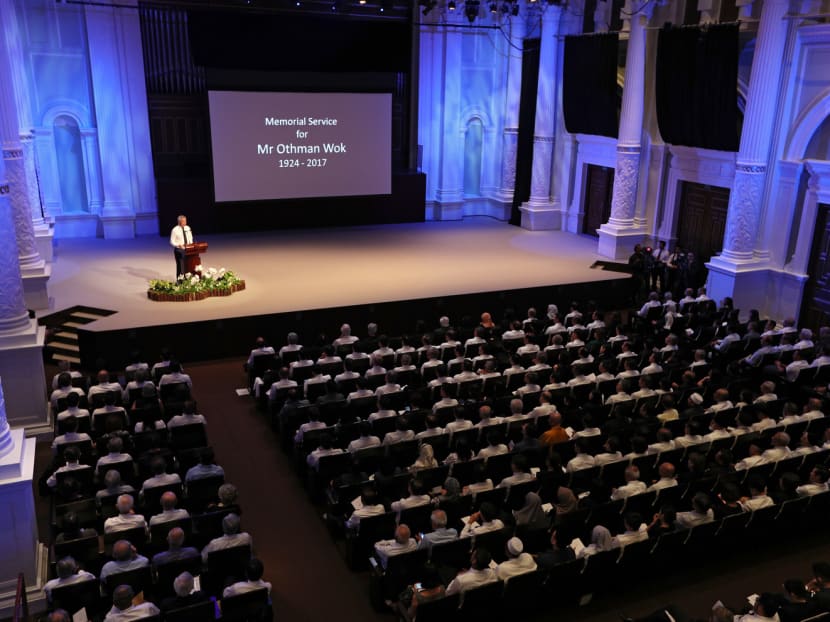No multiracial Singapore if not for Othman Wok: PM Lee
SINGAPORE — If not for Mr Othman Wok’s conviction in multiracial ideals, there might never have been an independent Singapore, much less one where citizens pledge themselves as a united people regardless of race, language and religion, said Prime Minister Lee Hsien Loong yesterday.

Prime Minister Lee Hsien Loong delivering a eulogy for the late Othman Wok at Victoria Concert Hall yesterday. Among those who also paid tribute to him were Communications and Information Minister Yaacob Ibrahim and Mr Othman’s son-in-law Munir Shah. PHOTO: MCI
SINGAPORE — If not for Mr Othman Wok’s conviction in multiracial ideals, there might never have been an independent Singapore, much less one where citizens pledge themselves as a united people regardless of race, language and religion, said Prime Minister Lee Hsien Loong yesterday.
Leading the tributes to Mr Othman — who died on Monday at the age of 92 after a long battle with cancer — at a memorial service held at Victoria Concert Hall, Mr Lee said that during an era when the People’s Action Party (PAP) was battling to stand up to Malay supremacists, it was “not only Chinese Singaporeans who could not be cowed by threats of riots and mayhem”.
“Malay Singaporeans too could not be easily seduced by appeals to race and religion. Singaporeans were an altogether obstreperous people. Better for Singapore to leave Malaysia. That set in train events which led to August 9, 1965,” said Mr Lee, referring to the day when Singapore seceded from Malaysia and became independent.
Mr Othman was the first Malay minister in the Republic’s inaugural Cabinet post-independence.
Following his death, tributes poured in from Singaporeans from all walks of life — including national leaders who said the country was indebted to the former Social Affairs Minister — while hundreds braved the heavy downpour to bid farewell to Mr Othman on Tuesday when the funeral procession and burial were held.
Yesterday, more than 600 invited guests — including Mr Othman’s friends and family, Old Guard colleagues such as former Cabinet Minister Ong Pang Boon, grassroots leaders from Pasir Panjang and representatives from religious and community groups — attended a memorial service, organised by OnePeople.sg.
Delivering the first of six eulogies for Mr Othman, Mr Lee said that a “golden thread that ran through his long life was his commitment to the ideal of a multiracial and multi-religious Singapore”.
Other speakers including Minister-in-charge of Muslim Affairs Yaacob Ibrahim and OnePeople.sg chairman Janil Puthucheary also highlighted Mr Othman’s conviction and belief in multiracialism, which, in Dr Yaacob’s words, “is ever more important today” at a time when extreme ideologies are “being peddled on many fronts”.
Mr Lee recounted how Mr Othman and other Malay Members of Parliament in the PAP knew they would have been richly rewarded had they swayed towards the Malay supremacy the United Malays National Organisation (Umno) sought during the 1963 election, yet none of them jumped ship.
“Had (Mr Othman) not been firm in that commitment, had he hesitated or wavered in the dark days of our Merger with Malaya and then Separation, when our history hung in the balance, the Singapore story would have turned out differently,” Mr Lee said.
Standing firmly by their loyalties to the PAP and the values it stood for despite intense and relentless pressure, Mr Othman and his Malay colleagues held a “sufficient portion” of the Malay ground in Singapore and “kept the dream of a multiracial society alive through those terrible dark days”, Mr Lee said.
“At stake was what kind of society we wished to live in: A multiracial society, with all races enjoying equal rights; or a system based on ethnic politics and racial dominance? A Malaysian Malaysia, as the PAP wanted; or Malay supremacy, as the Umno in Kuala Lumpur wanted?” he added.
On July 12, 1964, Umno organised a hostile rally in Pasir Panjang, which was Mr Othman’s own constituency, Mr Lee said.
Less than 10 days later, during a procession to mark Prophet Muhammad’s birthday, racial riots broke out. “Othman was convinced, with good reason, that the riots had been deliberately instigated,” Mr Lee said. “The purpose was to intimidate Singaporeans ... The target was not just Chinese Singaporeans, but also Othman and the Malay PAP leaders.” But despite facing abuse, denouncement and even death threats, they were not cowed and did not choose race over nation, Mr Lee said.
He recounted that after the 1964 racial riots, then Malaysian Deputy Prime Minister Tun Razak visited Singapore to “feel the pulse of Singapore Malays”, and concluded that Singapore Malays were different from Malayan Malays. “There is a Malay saying, ‘rambut sama hitam, hati lain-lain’, which means that we may look the same, but our hearts differ,” Mr Lee said.
He noted that Mr Othman’s assent to sign the Separation Agreement was also crucial. It was because Malay Singaporeans and Malay PAP leaders embraced the “nobler dream of a shared identity” that Singapore can practise a form of non-communal politics based on justice and equality that is unique in the region and rare in the world, he said.
Tracing Mr Othman’s contributions after independence, Mr Lee said that he was always “rolling up his sleeves, hands-on, setting an example”. For instance, when recruits were sought for the People’s Defence Force after Separation, Mr Othman was one of several ministers who stepped forward.
Mr Lee said that in looking back on Mr Othman’s illustrious life, one should also look ahead to the future of Singapore, as that was what he and his colleagues had fought for.
“So while it is with sorrow today that we bid farewell to one of Singapore’s greatest sons, we also give thanks for the extraordinary life of one who gave so much of himself to the nation.”






